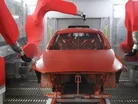[SLIDESHOW] How BMW and Mini vehicles are made

BMW is one of the most influential manufacturing brands in the world. BMW is synonymous with luxury automotive manufacturing not least because of its dedication to continuous innovation. From collaborative robotics to digital applications for automotive creation, the company is always pushing boundaries.
SEE MORE: How the Tesla Model S is made
BMW has 30 manufacturing plants in 14 countries on four continents and its culture of innovation is felt at every production facility. In the slideshow above Manufacturing Global takes a behind-the-scenes look at some of the factories located in Germany, the UK, the USA and the Netherlands.
SEE MORE: [VIDEO] How the world's first 3d printed car, the Strati, is made
Munich, Germany
- Established in 1922, Munich is BMW’s parent plant.
- Initially the facility produced aircraft engines and motorcycles.
- Automotive production started in 1952 and since more than 9.3 million cars have rolled off the assembly lines.
- Today, 950 cars are produced each workday, including the 3 Series Sedan, 3 Series Touring, 4 Series Coupe and the M4 Coupe.
- The site also produces more than 2,000 engines per workday. The engine range comprises BMW 3, 4, 8 and 12-cylinder petrol-powered engines, 6-cylinder diesel engines as well as 8-cylinder high-performance engines for the BMW M models.
Dingolfing, Germany
- Dingolfing is one of BMW’s largest production sites worldwide.
- Every day, around 1,500 vehicles of the BMW 3, 4, 5, 6 and 7 Series roll off the assembly line.
- The site also makes vehicle components such as pressed parts and seats as well as chassis and drivetrain components.
- It also supplies the Leipzig plant with key components for Rolls Royce and the new electric BMW i models, such as high-voltage batteries, e-transmissions and the drive structure.
Leipzig, Germany
- The Leipzig plant is one of the world’s most modern and sustainable car factories, setting new standards with its building structure and architecture.
- The body shop, paint shop and assembly are grouped under one roof, arranged like the spikes of a star around the central building.
- Another special feature is the floor plan of the assembly hall: thanks to its finger or comb structure, supplier parts can be fed to the assembly line directly from the outside in sequence.
- The plant does not only produce conventional vehicles but also vehicles with an electric drive and CFRP (carbon fiber reinforced polymer) lightweight body.
- Its product range comprises the BMW 1 Series 5-door, 2 Series Coupe, 2 Series Convertible, 2 Series Active Tourer, X1, BMW i3 and i8.
- With the ‘i’ production, the site has taken sustainability to the next level: the specific water consumption has been reduced by 70 percent and energy consumption by 50 percent.
Oxford, UK
- The facility in Oxford currently produces the new MINI Hatchback and Convertible, the Clubman and Clubvan, and the MINI Roadster and Coupe.
- Since the re-development of the Oxford site in 2001, the plant has employed around 4,000 people who make up to 1,000 MINI vehicles a day in three-shift operations.
- Top 10: Manufacturing Accomplishments of 2024Procurement & Supply Chain
- Stellantis Plant Shutdown Confirms EV Manufacturing ConcernsSustainability & ESG
- BMW Drives Emission-Free Battery Transport With EV TrucksSustainability & ESG
- Automotive Buyers Seek AI Integration, Not Costly Add-OnsAI & Automation

